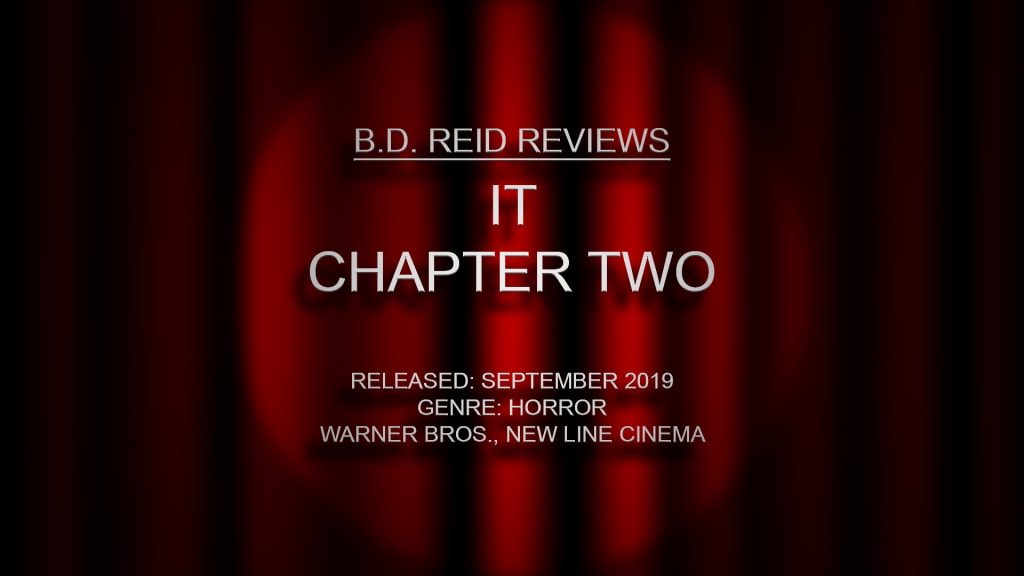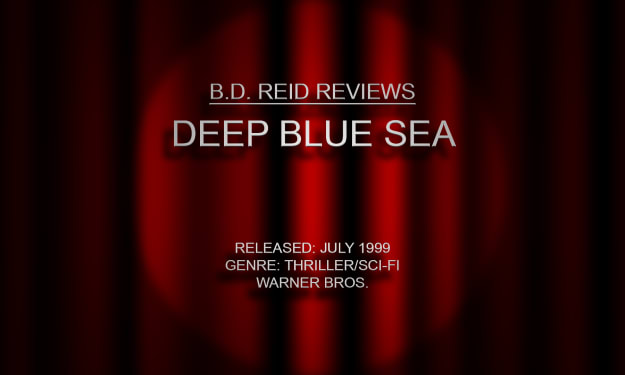
After the first film came out, I was laughing more than I was screaming; I genuinely though the movie was terrible because, in a darkened theatre, I wasn’t scared. Over time, I grew to love the film for it’s interactions between the characters, but it still didn’t change the lack of terror I felt for the clown. I remember the miniseries being very boring all together, but especially boring when the adults came around. So, I was expecting a very boring movie about adults trying to kill a demon clown and pretending to be afraid of it when I wasn’t. I was mainly going to see it because I had seen the first one, and the fiancé wanted to go. To my surprise, I got a film that I enjoyed much more than I was expecting.
Despite the film being three hours long, it never feels that way. The way that the characters interact with each other is phenomenal and their chemistry is completely believable. The plot moves at a pretty brisk pace and intercuts beautifully between the past and future. How apropos for a movie that’s all about memory. I’ll admit, I was worried about how unfortunate the child actors in the first film were because they wouldn’t get to be in the sequel. I was grateful that they got some amount of screen time. Having said that, it does make me feel like the first film is a little superfluous.
This one is 3 hours long, which is about 50% longer than the first film, and is almost as long as the miniseries itself is, but because they added scenes with the kids in this one to parallel the emotions of the adults, it mimics the miniseries and makes the first one almost pointless. Don’t get me wrong, the existence of the first one makes it easy to recognize who the characters in this one are and aids in connecting with them, especially in the scene at the Jade Palace (or whatever) where they demonstrate their chemistry and friendship.
But this movie shows us Pennywise scaring the kids from their past, just like the miniseries does and it does it better. The memories don’t come from cutaway gags after Mike calls them like in the miniseries, but rather as a result of being back in Derry and remembering their past. This creates the illusion that it’s uncovering a mystery and the flashback feels more natural.
Additionally, the way that they chose to film the transitions between past and present are visually interesting, and different for each character. We get a close up on Eddie fade away as Young Eddie comes into frame in a match cut, Beverly watches Young Bill bike away and turn to her old home. Bill gets cuts between his memory and the present when facing the sewer drain where Georgie died. Ben falls into the fort and the camera pans upward (foreshadowing his way out of his darkness) and he’s not there in the next shot. Even Stanley gets slow-mo and mute flashbacks as a nod to his failed attempts to repress his fears.
But because it’s so creative in the way that it’s filmed and part of the fun of this film is the adults uncovering the mysteries of their past, the first film is rendered mildly superfluous. Every single character gets reintroduced in both the past and the present, often in very creative ways.
Richie (played amazing by Bill Hader) is introduced throwing up towards the camera, taking a shot of bourbon, and going out on stage to talk about being in masturbaters anonymous. That tells you everything you need to know about Richie’s character and his use of laughter and comedy as a defense mechanism for his fear and his self hate. Speaking of which, I don’t know if Richie was gay in the book, but here, the reveal of him being in love with Eddie adds an extra layer to his character on re-watch and the despair that he feels after losing Eddie feels much more painful because of that revelation and his desire to keep that part of his hidden really speaks to the theme of the movie and burying demons.
Bill, in this film, is played (wonderfully) by James McAvoy. Despite his arc in the first film seemingly coming to a close where he’s able to finally accept that Georgie is dead and he’s finally able to let go of that fact, this film expands on that, delving more into the guilt that Bill feels. As with the other Losers (except Stanley and Ben, it seems), Bill has mostly forgotten his past in Derry and why he left. Watching him remember his repressed past is very engaging and now, he’s not only coming to terms with Georgie’s death, he’s coming to terms with the part that he played in that and accepting that it wasn’t his fault. That’s expanding on a character in a sequel that I can get behind and that scene where old and young confront each other is so wonderfully tense and dynamic.
Poor Stanley, and I mean that. The actor that plays him did such a good job in his thirty seconds of screen time (in a three hour film). I don’t really like the idea of glorifying suicide as the noble option, but to save it for the end made it seem more tolerable. Like wrapping up the last strand of plot.
Beverly is less engaging in this one, if I’m being perfectly honest. She had a lot more complexity and depth in the first one. Here, she’s kinda side-lined to be the object of desire for Ben. The scene with her in the bathroom stall is tense and all, but it kinda seemed like she couldn’t get out until Ben confessed his love, which works great for his arc, but not for her character. Besides, she already defeated her fear of her father (and Pennywise) is the first film. Unlike what Bill did by expanding on his character, however, Bev seems to repeat herself. Additionally, every scene with her character has her smoking. Bev in the first film didn’t smoke (at least to this degree), so it’s actually kinda distracting.
As with the first film, I could not stand the fact that there is a love triangle between Bill, Bev, and Ben. This time around, it’s Bev goal to try and uncover who her secret admirer was, and I don’t mean to be redundant, but the movie’s being redundant with itself. Bill and her share a kiss half-way through the film. The miniseries had Bev kiss several of the Losers and, of course, there is that scene in the book, but if I was the editor and I needed stuff out, the whole thing of Bev trying to hit on Bill would be cut immediately.
The only good thing about that subplot is that it does expand on Ben’s character. He does have to have confidence in himself enough to tell Bev that he loves her in the first one, so there is some redundancy. But here’s the thing, Bev left at the end of the first one, thereby preventing them from having a relationship, so Ben pined for her for 27 years. The idea of that is incredibly intriguing to me because of the cliché dodge. See, most movies would have the good-looking, rich guy be all about confidence and just kissing the woman he loves. Here, Ben is (to quote Pennywise) still just a fat kid. He can exercise all he wants, make all the money that he wants, but when it comes to love, he’s held onto a note from a girl he met in childhood because he’s never felt the same way about anyone else. It’s interesting to me to watch that kind of character have that kind of arc.
Mike isn’t really expanded in this film, I thought, but he is featured more. He’s kind of the mentor character that guides the real leads through the film. His flaw does come from his omission of the ritual’s final stage, but he makes up for it by knowing everything that the plot needs him to. His character is mostly convenience at the right time, spouting exposition, and being a walking embodiment of the theme of remembrance. To be honest, though, he oughta remember things a little better. Even in the first one, there wasn’t a whole lot of interaction between Mike and the rest of the Losers, and in this one, there really isn’t either. Based on his limited screen time in the first one, the bond that he has for his friends doesn’t feel as strong as his dialogue suggests.
Eddie is way better in this version than Andy Dick's portrayal was in the 1990s. The miniseries shows Eddie as a virgin hypochondriac, still living with his mother. This version he’s a risk analyst, which is what his character in the first one would grow up to be. And the fact that he owns his fear in the climax makes his a different kind of brave. Having said all of that, however, doesn’t Eddie kinda feel like a second version of Richie? The same style of humour, the same kind of delivery. Even the same use of laughter in the face of fear as a coping mechanism. However, it is great that Eddie has one of the greatest lines in the film: “you should shave that mullet, it’s been thirty years.”
There are two big things that I want to address with Eddie, both of which relate to his death. First, I think Eddie maybe knew that Richie had a thing for him and that’s why he was always making fun of him, trying to get Richie to feel at ease around him so they can still be friends. There’s also a small hint that maybe Eddie feels sorry for Richie, too, and they can never have the life that Richie wants, but they could still be friends. That’s why it’s so touching that his last words are to his best friend and are just another joke; it’s to get Richie to laugh because he knows he not going to make it. The other thing is that Eddie also gets to have a pretty big hero moment, trying to kill a monster to save his friend and dying while trying to save that same friend. Given the fact that earlier, Eddie froze when Richie was in danger, this was a quick turn that showed how much he really cared about his friends and how far he went in the end trying to save them. Plus, he took a knife to the cheek and used that same knife a second later to stab his attacker.
Hey, remember when I said Henry Bowers was a deep and complex bad guy? I would cut him completely from this movie. Seriously you could’ve cut him and the movie would be nearly no different. Save for how Eddie got that cheek scar, there’s little to no point to having Bowers in the story, and his character isn’t nearly as interesting this time around.
Now, I suppose that I should talk about the clown. Honestly, I had kinda the same feeling this time as I did last time. The aura of fear that Pennywise creates in our leads generates a foreboding sense of doom, but that is immediately removed when Pennywise appears. He appears to Richie as a clown and I swear, he is shorter than Richie. I know it’s a demon clown that’s supposed to embody your worst fear, but acting silly is no way to scare me. True, it creates a bigger contrast when he is the monster, resulting in a larger scare, but even a child isn’t afraid of him. It’s still hard for me to be afraid of him.
And honestly, that fear is not quelled when we get to the climax. While it’s very inventive, separating the Losers from one another so they have to battle their own demons to beat the fear within and defeat the clown, it is kind of muddled and I don’t think it follows its own rules very well. Yes, demonic clown. Yes, suspension of disbelief. Here’s what I’m talking about:
Mike says that Pennywise must take on the properties of whatever form he chooses to take. But Pennywise is a shapeshifter. Ergo, he can take on any shape. If he’s killable as a clown, he transforms into a giant spider-clown. If they can try and kill that, they he can turn into an eagle and fly away. And while Pennywise is busy being a giant, killer spider thingy, he’s also a Pomeranian, Betty Ripsom’s legs, the clubhouse, filling with dirt, a bathroom filling with blood, and a flooded basement containing both Georgie and young Bill. Yes, I think Pennywise can project the realities of his subject’s worst fears onto them, and like I said that makes for a very interesting climax (it’s very Digimon Adventure 2). But in the first one, Pennywise only took the shape of what they feared most, it was never established that he could manipulate their entire surroundings in a psychological way. Yes, he covers Bev’s bathroom in blood, and Bill’s basement in water, but it was always him making the scare.
I guess that you could argue that since they are adults now, their fears are more psychological than physical. Like Harry Potter being afraid of fear expressed as the dementor rather than being afraid of a physical threat such as Voldemort. This is why I like the climax, even though it’s a little dumb. It plays into the whole expansion that the characters are going through in their complexity. Children have very basic fears, and when we become adults it’s not as though we stop being afraid of those fears, but the reasoning behind those fears becomes more complex. A child can fear failing a test, but an adult fears being a failure as whole. I also think that it’s pretty clever that Richie, a comedian, is afraid of clowns. Both are known for making people laugh and make their living doing so. It’s almost as if Richie is more afraid of himself and his own fear of rejection and failure rather than Pennywise himself.
Bottom line, I liked this film more than I liked the first one. While I’m still not scared of Pennywise, the mythology and the aura that the characters create talking about him is very much like listening to a ghost story, raising the tension and making it more believable that they’d be afraid of him. The chemistry between the leads in believable and infectious; I genuine believe that these guys are old friends reminiscing about their past. The cinematography is really clever, and the editing compliments it very well. The music is eerie when it needs to be, but nostalgically whimsical when it needs to be. The movie does shift tonally in parts and it would be jarring except for the fact that the first one did it. This movie is meant as the mid-life crisis coming of age story where they have to remember how to be kids as well as adults and not live in their fear. I’m very glad that this is the last film in this franchise because it’s such a high note to go out on that doing anything else would just ruin what’s been done.
About the Creator
B.D. Reid
A competition-recognized screenwriter and filmmaker, building to a career that satisfies my creative drive but allows me to have time for friends and family.






Comments
There are no comments for this story
Be the first to respond and start the conversation.